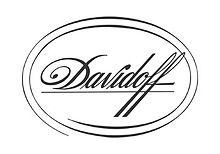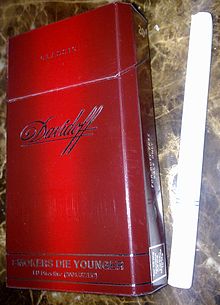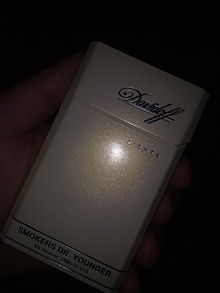- Davidoff
-
Davidoff is a Swiss luxury tobacco goods brand name, which is carried by a range of products including cigars, cigarettes and pipe tobaccos. Its cigarette brand is currently owned by Imperial Tobacco but the company is otherwise independently owned.
Contents
History
Zino Davidoff was born on March 11, 1906 in Kiev, Russian Empire, present-day Ukraine. He was the eldest of four children born to tobacco merchant, Henri Davidoff. Even in his own autobiographical writings, the facts on his youth are a bit hazy, as he was quite young during this time and could only piece together some stories of his youth. His parents were either cigar merchants or cigarette manufacturers in Kiev. Fleeing the political turmoil, his parents left some of their family behind and emigrated to Geneva, Switzerland in 1911 for a better life, where they opened their own tobacconist shop in 1912. Finishing school in 1924, Zino went to Latin America to learn about the tobacco trade, spending time in such places as Argentina, Brazil and finally Cuba where he spent two years working on a plantation and first encountered Cuban cigars.
Returning to Switzerland around 1930, he took over his parents' shop. What had originally been a modest tobacco shop grew into a rich business during and after World War II. Neutral Switzerland was spared much of the havoc wreaked elsewhere in Europe and became a haven for wealthy tobacco customers. Zino was particularly successful in marketing the Hoyo de Monterrey Châteaux Series of Cuban cigars created for Zurich cigar distributor A Dürr Co. in the 1940s and named after great Bordeaux wines. Around this time, Zino is also credited by many as having invented the first desktop cigar humidor, in order to preserve cigars at the same conditions of humidity and temperature under which they were rolled in Havana. Davidoff also had success writing several books on cigar smoking and Cuban cigar brands.
In 1970, Zino sold his small but highly successful tobacco shop in Geneva to the Max Oettinger Company. Zino stayed on as Davidoff’s ambassador until his death in 1994 at the age of 87. He was survived by his wife, a daughter and his three siblings.
The Max Oettiger Company, which took over Davidoff, was founded in 1875 and was one of the first importers of Havana cigars to Europe, selling its wares in France, Germany and Switzerland.[1] Headed by the Swiss-born Ernst Schneider, Oettiger paid in excess of $1 million for the Davidoff shop, considered by many at the time to be an exorbitant price.[1]
Cuban Davidoff cigars
In 1967, Davidoff was approached by Cubatabaco, Cuba's state tobacco monopoly after the Revolution, about creating a personal brand of cigars for his stores. The cigars were rolled in the newly-established El Laguito factory in Havana, which had been established to roll Cuban President Fidel Castro's own private cigars, Cohíba. In 1968, the first productions of Davidoff cigars were released, which included the No. 1, the No. 2, and Ambassadrice (which all shared the same sizes as the early Cohiba line) and the Châteaux Series (now no longer under the Hoyo de Monterrey label, but exclusively made for the Davidoff marque).
In the 1970s, the Mille Series, a milder blend than the rest of the line, and the Dom Pérignon, named for the famous champagne, were released on the market. In 1986, a special limited release of 80 Anniversarios cigars were made to celebrate Zino's 80th birthday.
In 1982, the Château Yquem cigar produced by Davidoff was discontinued after the owner of Château d'Yquem wine protested their unauthorized use of the trade name. The Château Mouton Rothschild came out shortly after, though with a different blend and slightly different size to its predecessor.
The Cuban Davidoff Line
The cigars within the Cuban Davidoff line included...
- No. 1 - 7½" x 38 (192 x 15.08 mm) Laguito No. 1, a long panetela
- No. 2 - 6" x 38 (152 x 15.08 mm) Laguito No. 2, a panetela
- Ambassadrice - 4½" x 26 (115 x 10.32 mm) Laguito No. 3, a cigarillo
- Tubo - 6" x 38 (152 x 15.08 mm) Laguito No. 2, a panetela (same blend as the No. 2)
- Dom Pérignon - 7" x 47 (178 x 18.65 mm) Julieta, a Churchill
Châteaux Series
- Château Haut-Brion - 4" x 40 (102 x 15.87 mm) Perla, a tres petit corona
- Château Lafite - 4½" x 40 (116 x 15.87 mm) Franciscano, a tres petit corona
- Château Lafite-Rothschild - 4½" x 40 (116 x 15.87 mm) Franciscano, a tres petit corona (name changed from above circa 1983)
- Château Latour - 5⅝" x 42 (142 x 16.67 mm) Corona, a corona
- Château Margaux - 5⅛" x 42 (129 x 16.67 mm) Mareva, a petit corona
- Château Mouton Rothschild - 6⅛" x 42 (155 x 16.67 mm) Corona Grande, a long corona
- Château Yquem - 6" x 42 (152 x 16.67 mm) ?, a long corona
Mille Series
- 1000 - 4⅝" x 34 (117 x 13.49 mm) Panetela, a small panetela
- 2000 - 5⅛" x 42 (129 x 16.67 mm) Mareva, a petit corona
- 3000 - 7" x 33 (178 x 13.10 mm) Ninfa, a slim panetela
- 4000 - 6⅛" x 42 (155 x 16.67 mm) Corona Grande, a long corona
- 5000 - 5⅝" x 46 (143 x 18.26 mm) Corona Gorda, a toro
Special Production
- 80 Aniversario - 9¼" x 47 (235 x 18.65 mm) Gran Corona, a giant or presidente
Apparently after numerous disputes over quality and ownership rights over the brand, Zino Davidoff and Cubatabaco decided to end their relationship. Leading up to this, in August 1989 Zino had publicly burned over one hundred thousand of his cigars that he had deemed of low quality and unfit to sell. The Cuban Davidoff line was officially discontinued in 1991 and an agreement was signed that no more Cuban Davidoffs would be sold in Davidoff shops worldwide. A Dominican-made Davidoff cigar had already hit the market in November 1990, where production of the sizes that had been made in Cuba continues to this day.
Former managers at El Laguito have claimed that the Davidoff blend was very similar to Cohíba, though with a lighter wrapper leaf. The bands used on Davidoff cigars themselves are of the same format that personalized diplomatic cigar bands had been in previous years. Adriano Martínez, a former executive of Habanos SA, confirmed in Min Ron Nee's Illustrated Encyclopaedia of Post-Revolution Havana Cigars that the Cohíba Línea 1492 was made to fill the gap left by the discontinuation of Davidoff.
The huge success of the Davidoff brand may have been instrumental in making Dominican premium cigars the number-one bestsellers worldwide, though many would argue that this is solely as a result of the U.S. embargo on Cuban cigars. Speculation is rife in the industry about the possible effect on sales volume following Castro's death and the likely easing of the import ban.
Davidoff Products Today
In August 2006, Imperial Tobacco acquired the worldwide Davidoff cigarette trademark from its owners, Tchibo Holding AG for £368 million (€540 million). Imperial Tobacco Group had been the licensee of the worldwide Davidoff cigarette trademark since its acquisition of Reemtsma in 2002.
The cigarette range includes the Magnum, Supreme, Classic, Mild, Lights, Magnum Lights, Slims, Super Slims, Ultra lights, Menthol, Menthol Lights, One and Gold. Rothmans, Benson & Hedges of Canada began importing Davidoff cigarettes for sale in the Canadian market in April 2007.
The Oettinger Davidoff Group owns the worldwide Davidoff trademark for tobacco products other than cigarettes. Davidoff cigars continue to be produced in the Dominican Republic, under the direction of cigar blender Hendrik "Henke" Kelner. Since moving to the Dominican Republic, most of the vitolas were retained, although the Chateaux series was renamed the "Grand Cru" series and the names switched from wine estates names to simply numbers, and the Dom Perignon was discontinued. Davidoff has also added an Aniversario series, a Millennium series, and a Special series of figurados to its lineup, along with numerous limited edition and yearly special releases. Davidoff also produces a line of cigars known as "Zino" and a line of cigarillos.
Beyond tobacco products, Davidoff has expanded to include under its brand such items as pipes and humidors.
Coty Prestige formerly Lancaster holds the license for perfumes which includes Cool Water.
See also
Footnotes
Further reading
- Min Ron Nee, An Illustrated Encyclopaedia of Post-Revolution Havana Cigars (2003, Reprinted: 2005).
- James Suckling, "In Search of Davidoffs: Connoisseurs are Buying Up Stocks of the Swiss Cigar Maker's Discontinued Havanas," Cigar Aficionado, vol. 2, no. 1 (Autumn 1993), pp. 46-55.
External links
- Official website Inaccessible for most UK & French internet users because UK & French legislation bans tobacco advertising and promotion.
- Official Davidoff online store New York Store fronts.
- Imperial Tobacco
- Camacho Cigars (recently acquired)
- Vicente of London Davidoff Appointed Merchant U.S.
Imperial Tobacco Brands Backwoods · Bali Shag · Cabinet · Classic · Davidoff · Drum · Ducados Rubio · Dutch Masters · Dux · Embassy · Ernte 23 · Excellence · Farías · Fine · Fortuna · Gauloises · Gitanes · Golden Virginia · H. Upmann · Henry Clay · Horizon · JPS · Lambert & Butler · Malibu · Marquise · Maxim · McClintock · Mocne · Montclair · Montecristo · Mustang · News · Nobel · Phillies · Por Larrañaga · Premier · Quintero · R1 · Regal · Richmond · Rizla · Romeo y Julieta · Route 66 · Sonoma · Superkings · Trinidad · USA Gold · Van Nelle · Vegafina · West · Windsor BlueSubsidiaries Predecessors Edwards Ringer · F & J Smith · Franklyn Davey · J & F Bell · Lambert & Butler · Stephen Mitchell & Son · W.D. & H.O. Wills · William Clarke & Son
Categories:- Cigar brands
- Cigarette brands
- Luxury brands
- Tobacciana
- Tobacco companies of Switzerland
Wikimedia Foundation. 2010.




